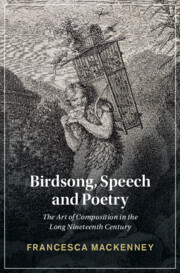Book contents
- Birdsong, Speech and Poetry
- Cambridge Studies In Nineteenth-Century Literature And Culture
- Birdsong, Speech and Poetry
- Copyright page
- Dedication
- Contents
- Figures
- Acknowledgements
- Introduction
- Chapter 1 The Science of Birdsong
- Chapter 2 The Science of Language:
- Chapter 3 ‘Prelusive Notes’
- Chapter 4 ‘Undersong’
- Chapter 5 ‘We Teach ’Em Airs That Way’
- Conclusion
- Notes
- Bibliography
- Index
- Cambridge Studies In Nineteenth-Century Literature And Culture
Chapter 1 - The Science of Birdsong
1773–1871
Published online by Cambridge University Press: 15 September 2022
- Birdsong, Speech and Poetry
- Cambridge Studies In Nineteenth-Century Literature And Culture
- Birdsong, Speech and Poetry
- Copyright page
- Dedication
- Contents
- Figures
- Acknowledgements
- Introduction
- Chapter 1 The Science of Birdsong
- Chapter 2 The Science of Language:
- Chapter 3 ‘Prelusive Notes’
- Chapter 4 ‘Undersong’
- Chapter 5 ‘We Teach ’Em Airs That Way’
- Conclusion
- Notes
- Bibliography
- Index
- Cambridge Studies In Nineteenth-Century Literature And Culture
Summary
Since birds have been trained to sing for centuries, the scientific studies of birdsong examined in chapter one drew from an old and deep well of popular knowledge and experience. Naturalists relied on a mass of supporting evidence from an ancient and evidently lucrative trade in singing birds. The chapter examines records of bird-catching from eighteenth-century training manuals to Henry Mayhew’s extended discussion of the metropolitan ‘bird-trade’ in London Labour and The London Poor (1851) and the eventual decline of the London chaffinch-fanciers as recounted in W. H. Hudson’s Birds in London (1898). It then assesses the importance of this popular and highly competitive sport to an emerging scientific method based on practical experience, direct observation and controlled experiment. While Daines Barrington and Gilbert White observed apposite similarities between birdsong and human speech, the chapter observes an irregularity in how their studies were received: Barrington’s findings were relegated to the footnotes and appendices of natural history throughout the eighteenth and early nineteenth centuries. The chapter concludes by showing how this wealth of material was excavated from the footnotes and explicitly used to identify birdsong as ‘the nearest analogy’ to human speech in Charles Darwin’s The Descent of Man (1871).
Keywords
- Type
- Chapter
- Information
- Birdsong, Speech and PoetryThe Art of Composition in the Long Nineteenth Century, pp. 20 - 37Publisher: Cambridge University PressPrint publication year: 2022



